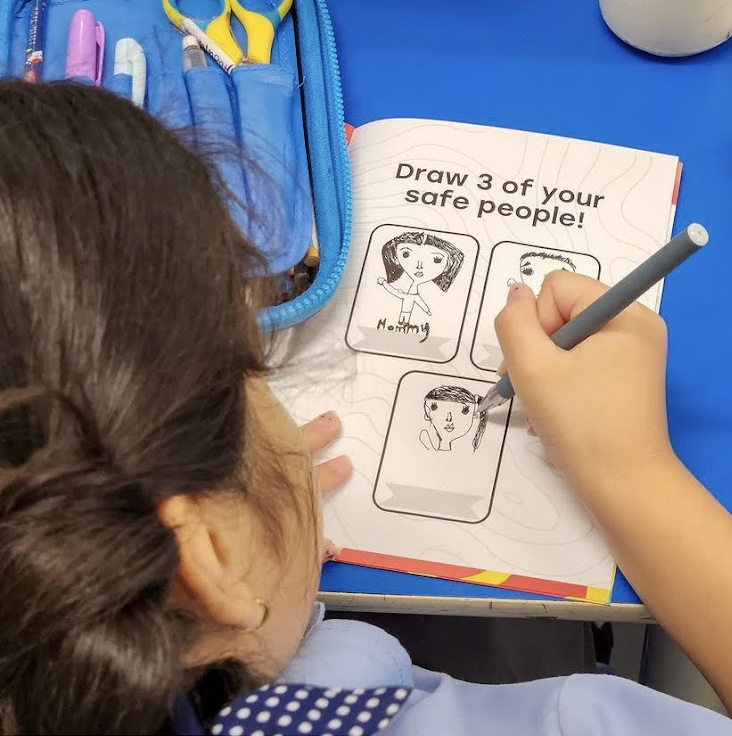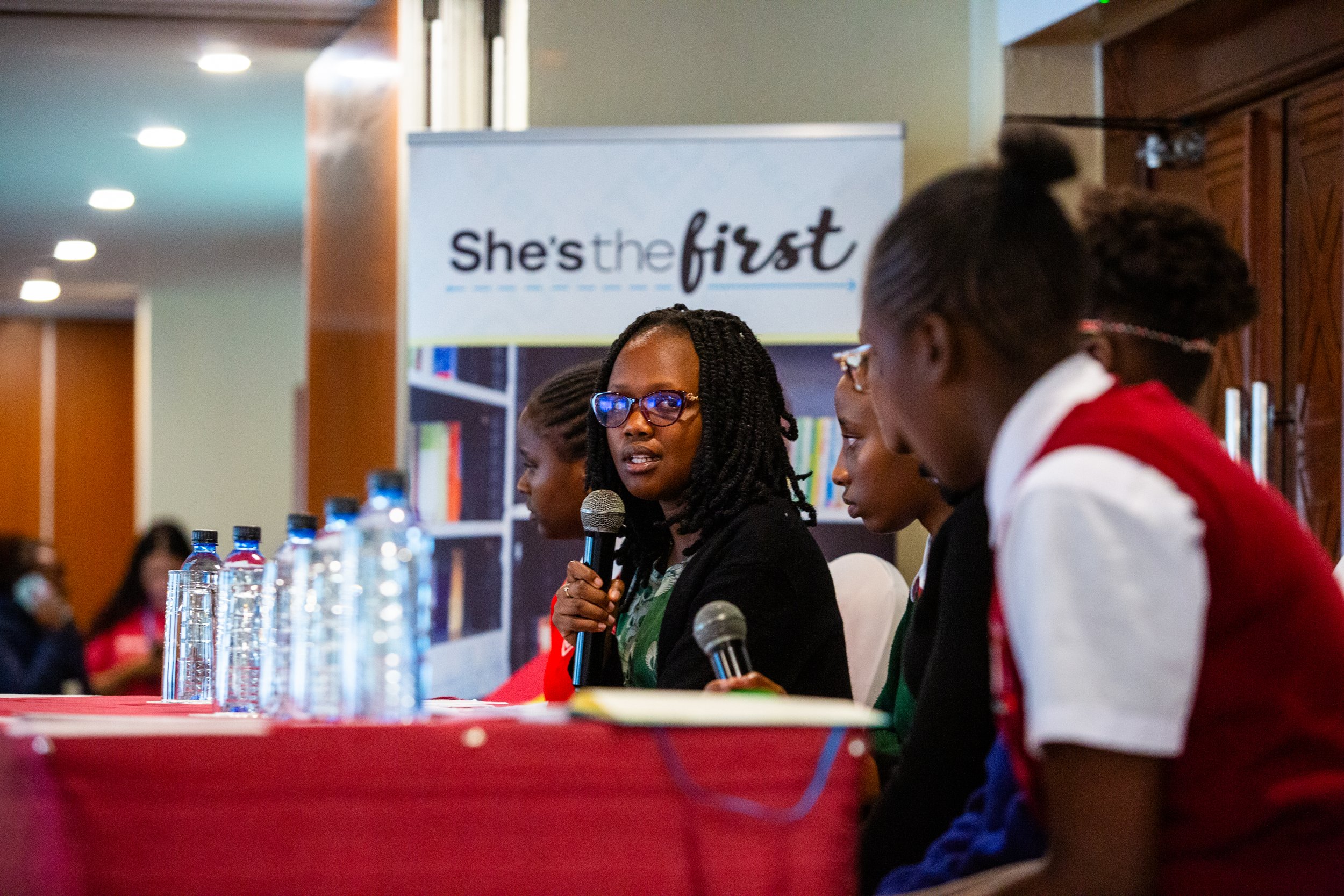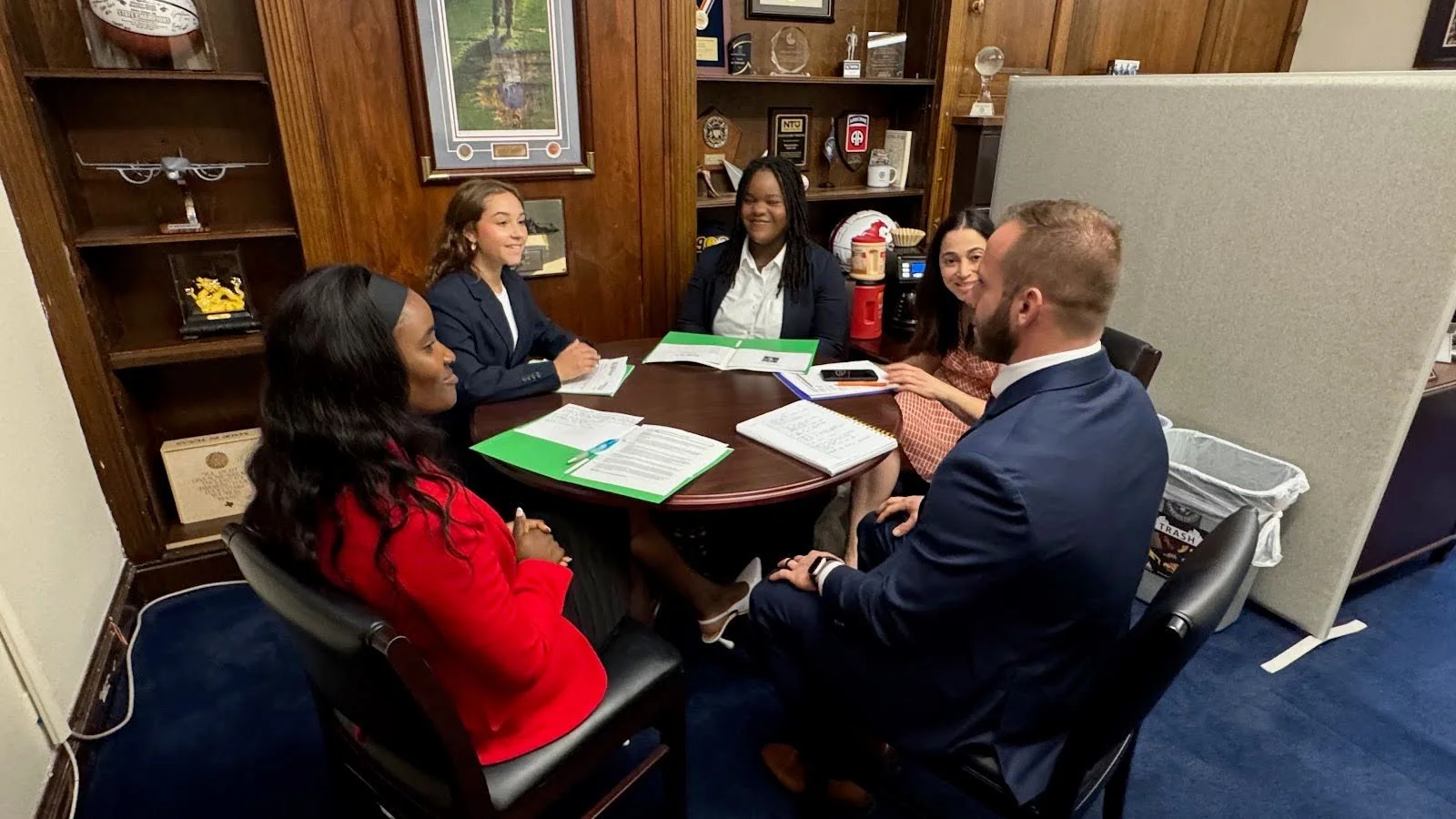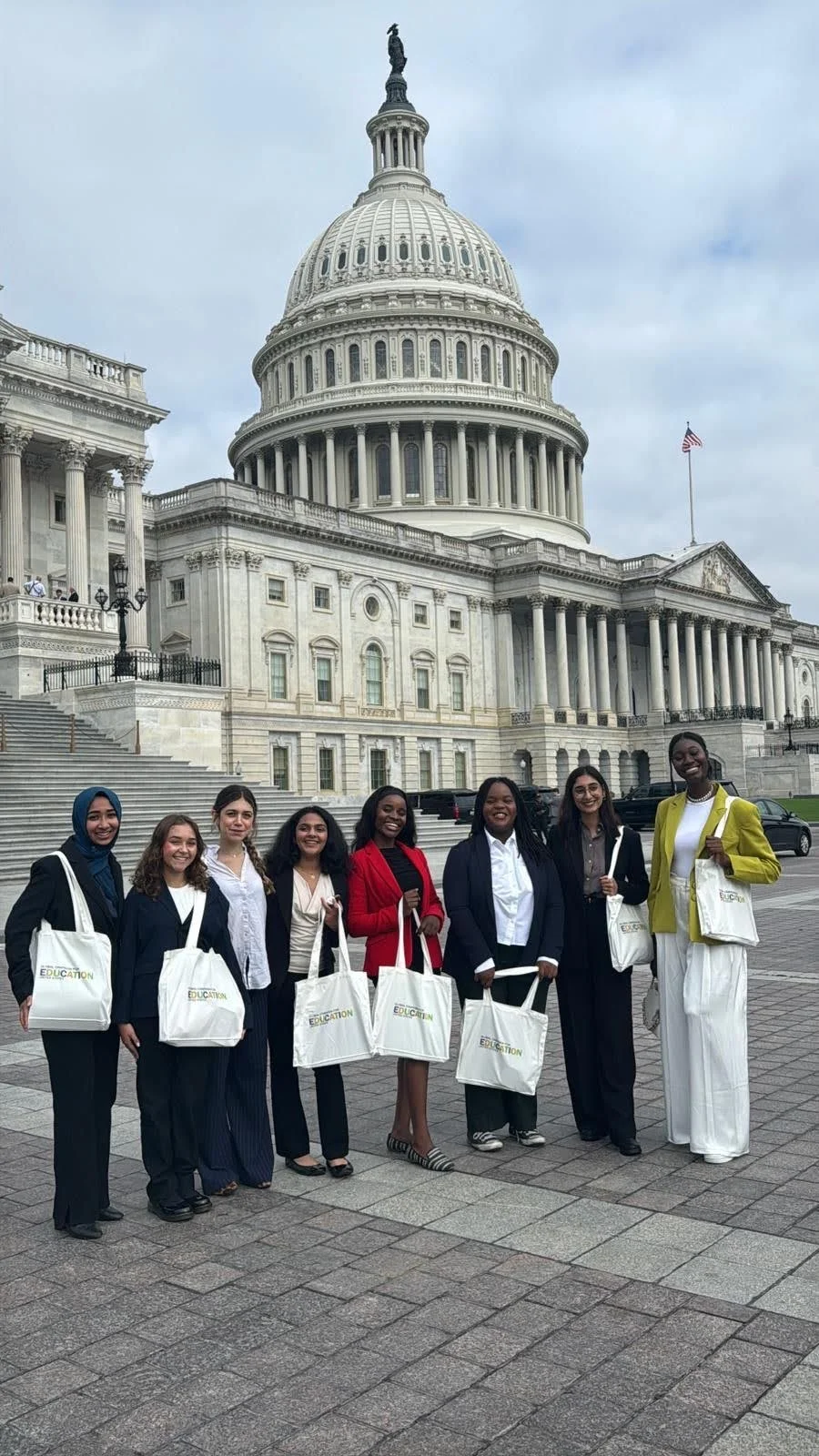When young leaders connect, magic happens. We saw this in action when Girl Rising Student Ambassador Zainab Bie from India and She's the First Chapter Leader Lara Almeida from the United States sat down to talk about their journeys in activism, from climate policy to education advocacy, and what fuels their hope. They swapped stories about family legacies, organizing period drives, lobbying on Capitol Hill, and even their favorite comfort foods. What stood out most? Their shared belief that girls’ voices matter everywhere, from classrooms to climate negotiations.
How I Found Hope in Advocacy by Speaking to Congress
By Lara Almeida, Girls Advisory Council member and President of STF Plano
Photos provided by Global Campaign for Education-United States
Often, I feel powerless and that those in power will rot this earth. When I think about my future, I fear I'll live in a greedy, overheated, and arbitrarily divided world. But on July 15, 2025, I talked to Congress on Capitol Hill— and ever since, part of me has changed my mind.
I never thought I would be “good enough” to speak to members of Congress at my nation’s capital. But when STF staff member Kate Lord encouraged me to apply to the Global Campaign for Education-United States’ (GCE-US) Youth Advocate program—and I got in—I started to realize that maybe I was.
My paternal grandfather grew up in a low-income family with a single mother in Brazil. He was the first in his family to earn a college degree—one in civil engineering that just so happened to break that cycle of intergenerational poverty. He married my grandmother, who was also the first in her family to graduate from college. Together, they raised a children’s psychologist, a lawyer, and my dad—a data scientist. Now, my brother and I will be the third generation to graduate from college.
Because of that one degree, we have warm beds and full plates. It was a no-brainer when my maternal grandfather moved from Nicaragua to Brazil for school, or when my parents moved from Brazil to the U.S. so my dad could grow a career, or when we moved from Washington to Texas so my dyslexic brother could attend an accessible school. We know the value of an education.
That was the story I told to the offices of seven U.S. senators and representatives—Keith Self, Mike Simpson, Robert Garcia, Mike Crapo, Alex Padilla, and Adam Schiff—as I advocated for American support of international basic education.
GCE-US’s 2025 Youth Advocates program brings young people to Capitol Hill to lobby for global education. In groups of youth with an accompanying adult, we pitched three priorities to legislative assistants: 1) funding for international basic education, 2) foreign assistance for children, and 3) participation in the Basic Education Caucus.
I was in awe of my team. Alongside me was Disability Justice advocate Helena Donato Sapp, who has four non-apparent learning disabilities, grew up bullied, and, like my family, her family spent years trying to find an accessible school. Refugee rights advocate Divine Irakoze shared how she grew up in a refugee camp in Malawi after her parents fled the Burundi civil war in 1994. She talked about how she recalls school meant sitting on rocks under trees and having fellow refugees as their teachers. We were guided by GCE-US executive director Giulia McPherson—a total sweetheart and one sharp leader.
After advocacy day, GCE-US asked us advocates to fill out a simple, short reflection form. But one question struck me: “What did you learn during Advocacy Day that you wish more people knew?” For me, the answer was simple: you matter.
First, you matter because your voice is valuable. She's the First has said it, and I’ll say it again: we are experts of our own communities. You don’t need to be a UN ambassador or global revolutionary to deserve a seat at the table. Your lived experience, girl expertise, local advocacy, and rockstar feminine confidence are enough.
“You don’t need to be a UN ambassador or global revolutionary to deserve a seat at the table. Your lived experience, girl expertise, local advocacy, and rockstar feminine confidence are enough.”
And second—despite frequent legislation that implies otherwise—there are people who care that you matter. As a clinically anxious, depressed, and sometimes passively suicidal teenager, as a queer person, and as the daughter of Latinx immigrants—it is so easy to feel utterly hopeless about the future. To feel that the entire world wants your downfall. But that’s not the truth. Right now, there are vast swaths of people doing everything they can to protect you. We even met some staffers who explicitly said our stories affirmed the work they were doing for education in the first place. When we stopped by a House committee meeting on the 2026 Appropriations Bill, we saw powerful, fierce people—including women—defend foreign assistance and the power of the purse. Even when we feel small, I promise: we are bigger than you can imagine. And we will not stop until you are safe. Stay here. Keep on going.
“Even when we feel small, I promise: we are bigger than you can imagine. And we will not stop until you are safe. Stay here. Keep on going.”
I still believe the powerful hurt this world. They have done it before and they are doing it now. After all, they are why organizations like She's the First and Global Campaign for Education need to exist. But I also believe that I—and the Helenas, Divines, Giulas, fervor-filled congresspeople, and passionate legislative interns— refuse to go down without a fight. Together, our presence is prominent and our demands undeniable.
Why Do You Need Feminism? She's the First Chapter Speaks Up
What Remote Learning Has Taught Me About Girls & COVID-19
Author: Anika Mukker, She’s the First Campus Community
I’m terrible with dates, but I’ll never forget March 13. That was the day my school announced that we would not be returning for four weeks due to the COVID-19 pandemic. Four weeks turned into seven months, and now I’m in 11th grade through distance learning.
Education has always been one of the most important parts of my life, and my love for learning was the driving factor for me getting involved with She’s the First. Nevertheless, adapting to virtual school has been challenging. Personally, having tangible projects helps me remain organized and engaged, and I value face-to-face interaction with teachers and peers. In fact, most of my closest friendships have all been built out of decade-long connections through school.
“Four weeks turned into seven months, and now I’m in 11th grade through distance learning.”
But, the pandemic has taught us is that we, as people, especially girls, are incredibly creative and resilient. Nowadays, I dedicate more time to planning out my routine and self-care while leveraging technology to maintain my connections and continue learning. I also try to participate as much as I can in online lectures -- asking questions, engaging in discussion, and putting a little more effort into connecting with my teachers.
However, COVID-19 and remote learning have also taught us that we cannot disregard the disproportionate impact of global crises on girls.
In April 2020, She’s the First published their Girls Can’t Wait report which states that over 750 million girls have been affected by the pandemic, and the Malala Fund projects 20 million more girls will not return to school when this is over, for a total of ~150 million girls out of school. A follow-up report published in September 2020 further details the severe impact—from steadily rising teenage pregnancy rates to increases in the number of girls working outside of their homes.
“For many, being taken out of school is more than losing out an education. It’s losing out on a safe space, a place to create dreams, and a network of support. ”
With schools being closed and students being forced to learn remotely, girls are separated from important connections with friends, teachers, and mentors as well as important programs. For many, being taken out of school is more than losing out an education. It’s losing out on a safe space, a place to create dreams, and a network of support.
All of this is coupled with the fact that the COVID-19 pandemic has exasperated the digital divide both on a professional and school level. In the same follow up report, community-based organizations also found that only 25% of girls have access to a tech device to aid in their learning.
With inequitable access to technology, girls' voices are quieted; they are unable to speak out on the issues that affect them, gain equal access to opportunities, and utilize necessary tools for their education. Right now, bridging this divide is more important than ever. Technology is an integral part of remote learning and provides a vital means for receiving an education even while schools are shut down.
“My computer, stable WiFi, and phone are the tools that have truly helped me succeed during this pandemic.”
As much as planning and organization have helped me with distance learning, simple things like my computer, stable WiFi, and phone are the tools that have truly helped me succeed during this pandemic. Without them, my questions would be left unanswered; I would not be able to take hold of opportunities in learning and advocacy.
So let our voices be heard: girls can’t wait. All girls have a right to an education, and we need to keep fighting until even a global pandemic cannot take that away.
Support the COVID-19 Response Fund to support girls’ most urgent needs through this pandemic, including remote access to education, hygiene kits, and more.
About Anika: Anika is a junior at Vista Del Lago High School in Folsom, California and the president/founder of her school’s She’s the First chapter. She’s extremely passionate about girls’ rights, especially when it comes to education and how girls lie at the intersection of so many different issues. Outside of STF, she’s involved in Model United Nations, as she aspires to study international relations in the future. In her spare time, she also loves to draw, write, listen to music, travel, and spend time with her loved ones.










